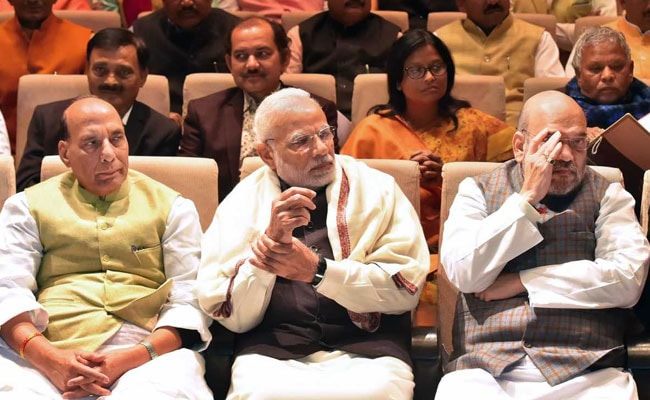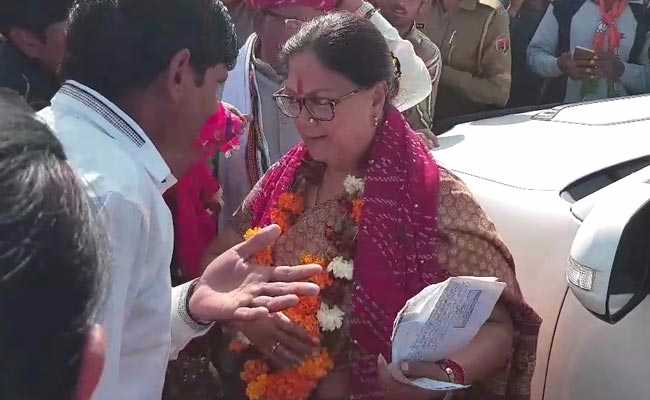In the 2014 Lok Sabha elections, the Modi-tsunami so overwhelmed Sachin Pilot, the brightest rising star of the Congress, as to drown his aspirations in a resounding defeat by 1,71,983 votes at the hands of a minor BJP luminary, Sanwar Lal Jat, who Modi rewarded with the post of junior minister in Water Resources under Uma Bharti.
Sanwar Lal-ji's death necessitated this bypoll. His son, Ramswaroop Lamba, was given the BJP ticket in the expectation that he would ride the sympathy wave generated by the passing away of his father. In the event, there was a complete reversal of the 60:40 BJP victory in 2014, with the Congress candidate taking nearly two-thirds of the vote and the BJP candidate being humbled to not much more than a third. The margin of defeat was a staggering 84, 414. This is not a defeat. It is a rout.
In 2014, Alwar, the stronghold of one of Rahul Gandhi's closest associates, Bhanwar Jitendra Singh, was hurled off the board by the Modi hurricane. He lost by a mind-blowing 2,83,894 votes to an archetypal RSS-BJP type, Mahant Chand Nath. In this bypoll, not only has that stunning margin been overcome, but Jitendra and his Congress colleagues have also ensured a massive margin of 1,96,496 votes. This again is not a "set-back" for the BJP, it is annihilation.

PM Narendra Modi (centre), BJP chief Amit Shah (right) and Home Minister Rajnath Singh at a BJP meet.
Instead of reading the writing on the wall, Kailash Vijayvargiya, BJP General Secretary and one of its leading motor mouths, who celebrates with hyperbole even a BJP win in a panchayat election, has comforted himself with the thought that "bypolls do not reflect the full picture". Of course they don't - but reversals of this order do not take place in the normal course. They signal massive disillusionment with the ruling dispensation in both Jaipur and New Delhi. They demonstrate that come the winter election season, the Congress is all set to coast to a victory in Jaipur. It also augurs smooth sailing, at least in Rajasthan, for the Congress in the next Lok Sabha election. There will certainly be no "Congress-mukt Bharat". Which is why Sachin Pilot's assessment is far closer to the mark: that "the party's comeback in a big state marks an important point in national politics".
How has this happened? And why? Commentators of my persuasion have maintained since 2014 that India was passing through an aberrant phase that was completely out of sync with not only independent India's repeated rejection of the kind of divisive politics that the BJP practices, but it was also out of sync with the country's millennial civilizational past. It took some conviction to hold onto that view as the BJP under Modi rode from victory to victory in a series of state elections and by-elections, bar Delhi and Bihar in 2015 and Punjab in 2017, despite the terrible record of saffron governance. As BJP activists never tire of pointing out, as many as 19 states of the Union now have BJP governments. The Rajasthan bypolls suggest that the aberrant phase is waning.

Defeat in the bypolls is a big blow for Rajasthan Chief Minister Vasundhara Raje
Time alone will tell whether Modi's time is getting over. But the straws in the wind do suggest that his rise is over, his decline has begun. This is underlined by Seth's description of the way the BJP campaign veered off course from vikas to the slogan, "Raj tilak ki karotayari / Aa rahe hain bhagwadhari" (Prepare the mark of the Ruler / The saffron-wearers are coming"). Finding that even that was not working, resort was finally (and despairingly) had to"Bharat ka abhiman hai Hindu/Matrabhoomi ki shaan hai Hindu" (The pride of India is the Hindu/The glory of the Motherland is the Hindu). Clearly, on seeing that neither Raje's performance nor Modi/Shah's stab at sab ka saath/sabka vikas were working, they fell back on their basic strategy - polarization on communal lines.
The BJP were also severely handicapped by the ongoing agitation of the Karni Sena. Vasundhara sought to appease the Rajput lobby by banning "Padmaavat" despite the Supreme Court's orders, but, finding that failing, the BJP played the Hindu card, hoping that this would bring Rajputs and Jats together on a common Hindu platform. The electorate did not buy this ploy. Perhaps it was their intense aversion to Vasundhara Raje that prevailed. More hopefully, for those like me who feel passionately for a secular India, saffron slogans are losing their appeal.

Congress workers celebrating the win in the Rajasthan bypolls
Modi would be mistaken in thinking that it is all his Chief Ministers' fault. The truth is that the cover story he invented for demonetization - namely, that it was the most drastic measure ever to unearth black money - no longer has the credibility it might have had during the UP elections and the Delhi municipal elections. There is a growing realization among all sectionsof voters that Modi has taken them for a ride.
This has been compounded by faltering growth and the ridiculous way Arun Jaitley conceived and implemented the GST. They are backtracking on almost every fault line in the GST that we had pointed out in the Rajya Sabha Select Committee of which I was a a member, but this backtracking is being perceived, accurately, as a confession of having messed things up in the first place. Employment prospects are in the doldrums; far from agricultural incomes doubling, as Modi had promised, they are stagnating and even declining in real terms; and economic recovery is a statistical illusion on the far horizon.
These are the underlying causes of the BJP's disastrous performance in the Rajasthan by-polls and, as these are not local factors but applicable nation-wide, I think we can confidently predict that historians of the Modi era will trace what went wrong for the BJP aberration in the country as a whole were much the same as brought about the disastrous reverses in Rajasthan. That is the larger lesson the nation is learning.
(Mani Shankar Aiyar is former Congress MP, Lok Sabha and Rajya Sabha.)
Disclaimer: The opinions expressed within this article are the personal opinions of the author. The facts and opinions appearing in the article do not reflect the views of NDTV and NDTV does not assume any responsibility or liability for the same.


